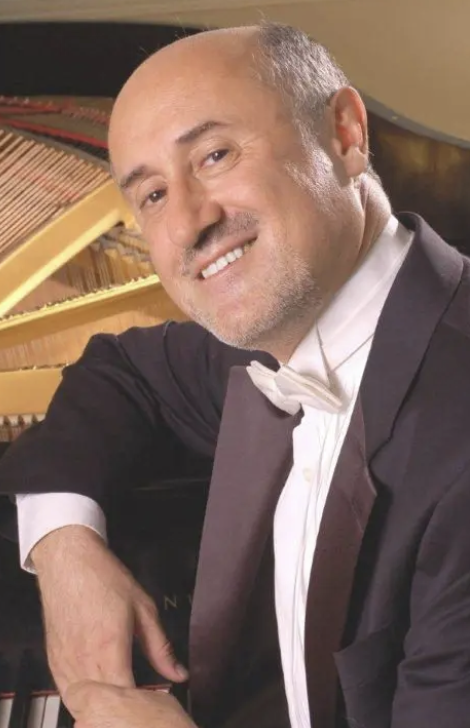|
Symphony
SRS SEASON ENDS WITH RESOUNDING TA-TA-TA-BANG
by Terry McNeill
Sunday, June 1, 2025
Symphony
YOUTHFUL VIRTUOSITY ON DISPLAY AT USO'S MAY CONCERTS
by Peter Lert
Saturday, May 17, 2025
Symphony
MYSTICAL PLANETS AND LIVELY GERSHWIN ORTIZ AT FINAL SRS CONCERT
by Peter Lert
Sunday, May 4, 2025
Symphony
VSO'S CONCERT MUSIC OF TIME, MUSIC OF PLACE
by Peter Lert
Sunday, April 27, 2025
Choral and Vocal
VOCAL ELEGANCE AND FIRE AT THE 222'S RECITAL APRIL 26
by Pamela Hicks Gailey
Saturday, April 26, 2025
CANTIAMO SONOMA SINGS AN INSPIRED GOOD FRIDAY MOZART REQUIEM CONCERT
by Pamela Hicks Gailey
Friday, April 18, 2025
DRAMATIC SHOSTAKOVICH SYMPHONY CLOSES PHILHARMONIC'S 25TH SEASON
by Terry McNeill
Sunday, April 13, 2025
LARGE COLLEGE OF MARIN AUDIENCE GREETS STOPHER ARTISTRY
by Terry McNeill
Saturday, April 5, 2025
Chamber
FRISSON DELIVERS SHIVERS OF DELIGHT
by Abby Wasserman
Sunday, March 30, 2025
OLD AND MOSTLY NEW IN SRS MARCH CONCERT IN WEILL
by Peter Lert
Saturday, March 22, 2025
|
 |
 PIANIST DMITRY RACHMANOV |
POTENT SCRIABIN INTERPRETATIONS AT SPRING LAKE VILLAGE RECITAL
by Terry McNeill
Wednesday, August 16, 2023
Returning to Santa Rosa Aug. 16 after seven years, Los Angeles-based pianist Dmitry Rachmanov performed an eclectic program before a full-house of residents in the Spring Lake Village retirement home’s concert series.
The opening three works, two of Beethoven’s late Bagatelles (Op. 126, G Major and Minor) and Chopin’s popular A-Flat Ballade, were well played but disclosed the house piano’s dry and too bright top end, increased by the hall’s poor acoustics. The B Minor Bagatelle had the required profundity, and the Ballade was played more slowly than usual, with small decrescendos in repeated phrases and emphasis on the soft rocking motifs. Careful pedaling was on display.
Russian music comprised the bulk of the recital, and the artist, a Moscow native and now chair of keyboard studies at CSU Northridge, was firmly in control of three early Rachmaninoff works from Op. 3 (Morceaux de Fantaisie), six short Scriabin pieces and the monumental Fifth Sonata.
A relaxed mood characterized the Rachmaninoff Elegy and Mr. Rachmanov brought out the melancholy, a stark contrast with the following famous C-Sharp Minor Prelude (“Bells of Moscow”). Here again the tempos were moderate, and in the Prelude’s middle section there were small but admirable interpretative touches. The lyrical E Major “Melody” was a highlight, the harmonies the pianist caressed foreshadowed the big later sets of Preludes from Op. 23 and 32. Lovely playing.
Mr. Rachmanov has a world reputation with Scriabin, having recorded most of the composer’s music and edited scholarly editions of the scores. The meandering A Major Prelude, Op. 15, No. 1, did rove about, but the interpretation proved that all that wander are not lost. The Op. 14 Impromptu had a sad and improvisatory character, beautifully performed. Two Op. 42 Etudes followed, both with clean musical lines, even trills and careful phrasing. It was good to hear these studies rather than the more popular number five from the Op. 42 set of eight.
The Poem and Prelude from Op. 59 were perhaps an audience challenge, both played atmospherically in different ways. There was continual emphasis on projected single notes, and swirling repeated figurations in the Prelude that underscored the dissonances. Both are unique compositions, here ardently rendered.
The one-movement Sonata from 1908 was preceded by the artist reading the composers’ short poem from the Le Poéme de l’Extase, and then he dived headlong into the roaring seven-octave introductory bars. The work without a key signature has been a signature piece for Mr. Rachmanov, and he brought to bear rhythmic fluidity and a masterful sensitivity to chordal weighting. Over 12 minutes the potent music was played orchestrally with palpable contrasting sections and generated a standing ovation. The memorable main theme is marked Volando, and it indeed soared from the pianist’s sterling fingers and feet.
What encore could compete with such dynamic virtuosity? It was another masterwork with robust contrasts, Chopin’s Nocturne in B, Op. 9, No. 3. Here the artist made the most of the many key shifts, the stormy quality of the score, and the beguiling vocal fioratura.
|

